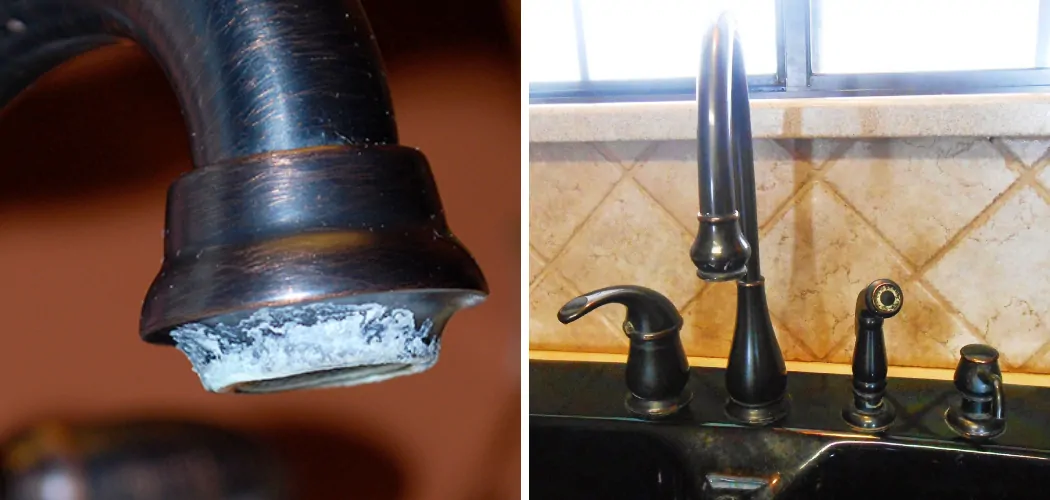Are you struggling to remove hard water stains from your black faucet? Don’t worry—this is a common problem, and there are simple solutions. Here’s how to remove hard water stains from black faucet in no time.
If you’ve ever experienced hard water stains on your faucet, you know how unsightly and difficult they can be to remove. While numerous cleaning solutions are available in stores, sometimes these products are ineffective in eliminating tough spots like those found on black fixtures. But don’t worry – removing hard water stains from a black faucet doesn’t have to be overly complicated.
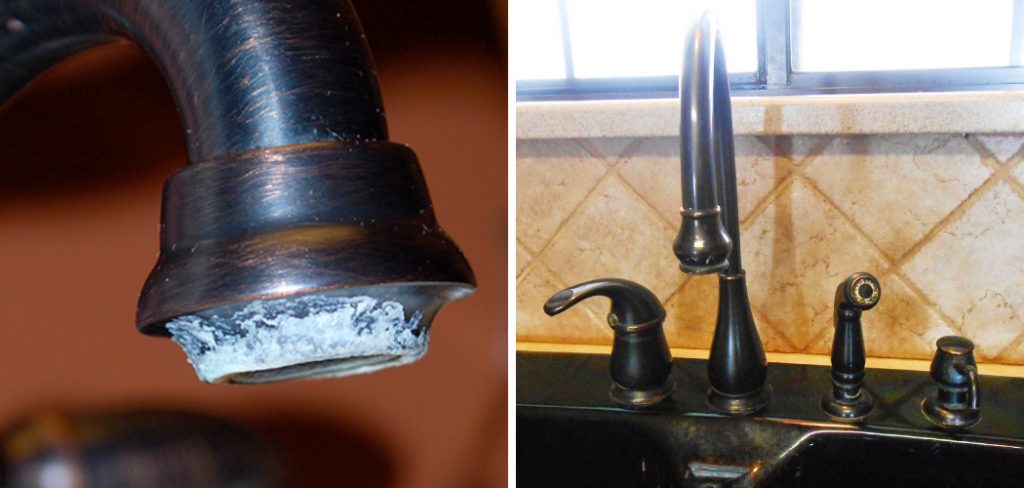
In this blog post, we’ll provide simple steps for tackling even the most stubborn marks so that your shower or sink fixture can be restored to its former glory!
What are the Causes of Hard Water Stains?
Hard water is caused by minerals such as calcium and magnesium in your home’s plumbing system. As the hard water runs through your pipes, it leaves behind these deposits, creating spots on your fixtures.
Another factor contributing to these stubborn stains is the black finish of your faucet. The dark color of the fixture can make it difficult to see where the actual stain is, making it even harder to remove.
Additionally, regular exposure to hard water can lead to limescale buildup on the surface. This accumulation makes it even more difficult for cleaning products to penetrate and remove the marks.
What Will You Need?
Before you begin, make sure you have the following items on hand:
- White vinegar
- Baking soda
- Sponge or cloth
- Soft scrubbing pad
- Toothbrush (optional)
Once you’ve gathered all the necessary materials, it’s time to start tackling those hard water stains.
10 Easy Steps on How to Remove Hard Water Stains From Black Faucet
Step 1: Use Vinegar and Baking Soda
Mix equal parts of white vinegar and baking soda to form a paste. Apply this paste to the affected area, let it sit for at least 10 minutes, and then scrub the surface with a soft cloth or sponge. Be careful not to scrub too hard, as this could damage the black finish of your faucet.
Step 2: Use Hot Water
Fill a bucket with hot water and submerge the faucet into it. Let it soak for 10 minutes and then use a soft sponge to rub the affected area. Try to use a back-and-forth motion, and rinse the sponge after each stroke.
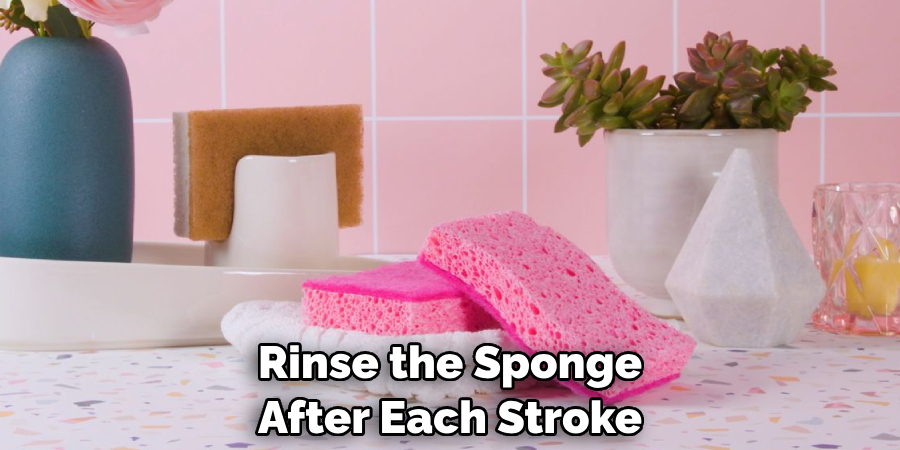
Step 3: Use a Soft Scrubbing Pad
If the vinegar and baking soda paste doesn’t seem to be doing the trick, try using a soft scrubbing pad. You can find these at most grocery stores or hardware stores. Dip the pad into hot water and scrub the affected area gently in a circular motion.
Step 4: Use a Toothbrush
If you’re still not seeing results, grab an old toothbrush and use it to scrub away at the stubborn spots. Add a bit of white vinegar or baking soda to help loosen up any remaining residue. Don’t scrub too hard!
Step 5: Rinse with Warm Water
Once you’ve scrubbed away the hard water stains, make sure to rinse the faucet off with warm water. This will help eliminate any remaining debris and ensure a sparkly clean finish! Also, dry the faucet off with a soft cloth or towel.
Step 6: Add a Protective Coating
To help prevent hard water stains from returning, you should apply a protective coating to your black faucet. Numerous products available in stores can be used for this purpose. Make sure to follow the manufacturer’s instructions when applying the product and let it sit for at least 8 hours before using the fixture again.
Step 7: Keep Your Faucet Clean
To make sure your faucet continues to look like new, it’s important to clean it on a regular basis. Use a soft cloth and some warm water to wipe away any dirt or debris that may have accumulated on the surface. This will help keep hard water stains away! Ensure to dry the faucet off afterward with a soft towel.
Step 8: Consider Water Softener
If you’re dealing with hard water stains regularly, then it may be time to consider installing a water softener. This device will help reduce the amount of minerals in your home’s plumbing system, thus eliminating the chance of future hard water spots. As a bonus, this will also help prolong the life of your plumbing fixtures!
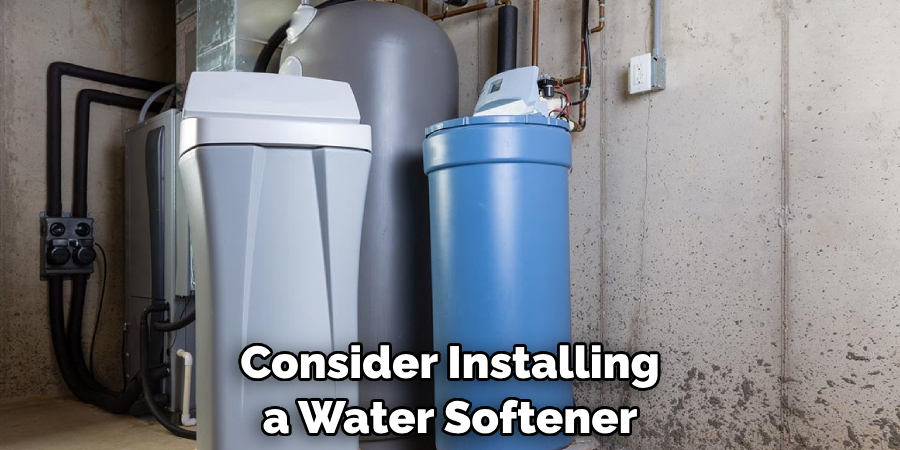
Step 9: Use Commercial Cleaners
If all else fails, commercial cleaners can be used to remove hard water stains from black faucets. These products usually contain powerful chemicals and should be used with caution. Always follow the manufacturer’s instructions when using these products, and make sure to wear protective gloves and goggles.
Step 10: Call a Professional
If the hard water stains are too stubborn or difficult to remove, then it may be time to call a professional. A plumbing expert can help identify and address the underlying causes of your issue and provide advice on how best to clean and maintain your faucet in the future. Remember, it’s always best to seek professional help if you’re unsure of how to proceed.
5 Additional Tips and Tricks
- Don’t wait too long to remove hard water stains from your black faucet. The longer they sit, the harder it will be to eliminate them.
- Avoid using abrasive cleaners such as steel wool or scouring pads. These can scratch and damage the finish of your fixture.
- Try using a mixture of baking soda and peroxide paste to tackle tough hard water stains. This combination works wonders on black faucets!
- If the stain is located in a difficult-to-reach area, use an old toothbrush to help scrub away at it.
- Clean your black faucet regularly with warm water and a soft cloth or sponge so that you can prevent future hard water stains.
Removing hard water stains from black faucets doesn’t have to be a difficult task! With the right tools and techniques, you can get rid of those stubborn spots in no time. Just remember to take your time cleaning and always use caution when using commercial cleaners or other harsh chemicals.
5 Things You Should Avoid
- Never use bleach or other harsh chemicals on your black faucet. This could cause damage to the surface and make it harder to remove hard water stains.
- Don’t scrub too aggressively, as this can also cause scratches and damage the finish of your fixture.
- Avoid using abrasive materials such as steel wool or scouring pads, as these can scratch and damage the black finish of your faucet.
- Don’t wait too long to remove hard water stains, as this will make them harder to remove.
- Try not to use commercial cleaners unless absolutely necessary, as they can be harsh on the surface of your black faucet.

With a bit of patience and these tips in mind, you can remove those hard water stains from your black faucet easily. Remember to take your time and use the proper tools and techniques for a sparkly clean finish!
Why Does Vinegar Break Down Calcium?
Vinegar contains acetic acid, which is highly acidic and can break down the calcium deposits that cause hard water stains. The acid in the vinegar will react with the calcium ions and form a soluble solution that can be easily wiped away with a cloth or sponge. Vinegar’s ability to break down stubborn calcium deposits makes it ideal for removing hard water stains from black faucets.
In addition, vinegar is also a great natural cleaner and can help remove dirt and grime from surfaces. It’s also a powerful deodorizer, so if your black faucet has been emitting unpleasant odors, try using some vinegar to get rid of the smell!
Which Salt is Used to Remove Permanent Hardness of Water?
Salt is typically used to treat water with permanent hardness. The most commonly used salt is called sodium chloride or table salt. This salt will act as a softening agent and help reduce the amount of calcium and magnesium in your water, thus making it softer. Additionally, table salt can also help improve the taste and smell of your water since these minerals can cause unpleasant odors and tastes.
When using salt to treat permanent hardness, it’s important to use the right amount. Too much salt can make your water even harder, so follow the directions on the package for the best results. Additionally, you may need to replace or recharge the filter depending on how much water is used in your home.
By using the right techniques and products, you can easily remove hard water stains from black faucets and keep them looking like new! With a bit of patience and the right tools, you’ll enjoy sparkling clean fixtures with no worries about pesky hard water spots.
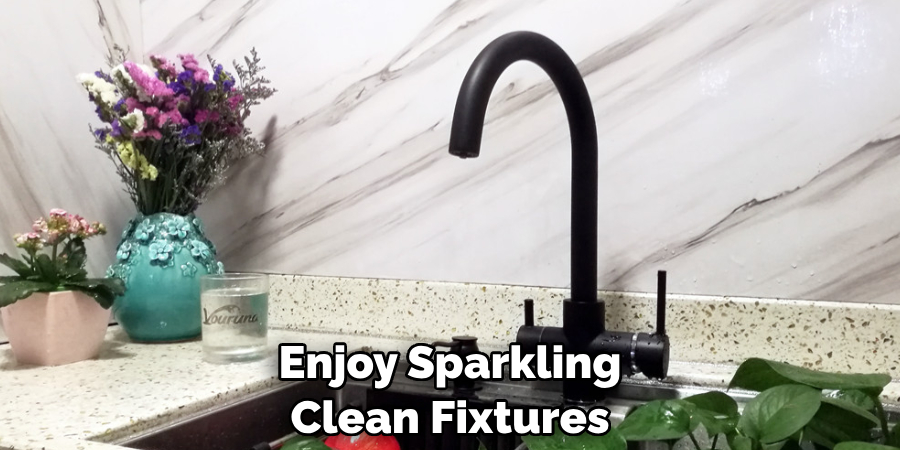
Conclusion
Hard water stains can be a nuisance, but knowing how to remove hard water stains from black faucet is an invaluable skill that can save homeowners from lots of frustration and wasted time.
Hard water stain removal can also make for a great DIY project to help spruce up your home. Hopefully, with the information provided, you have the necessary skills to navigate hard water stains and keep your black faucet looking good as new.
If you were feeling adventurous after reading this post, now would be the perfect time to learn to plug faucet holes in granite countertops! You don’t need special tools or skills either; plugging your faucet holes could help save money and provide a sense of accomplishment.
Remember, plenty of resources are available online if you need extra assistance. So let’s get started and give our counters some love with these easy DIY projects.

